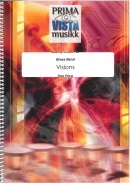Results
-
£14.95
The Pilgrim Way (Brass Band - Score only) - Ball, Eric
Attempting to recreate the atmosphere of mediaeval pilgrims, this suite comprises three separate, yet linked movements. I. Based on John Bunyan's poem 'He Who Would Valiant Be', the music reminds us of the words 'No foes shall stay his might, though he with giants fight, he will make good his right to be a pilgrim'. II. A transcription of the composer's own setting of 'God be in my head'. III. The original themes in this movement express feelings of joy and excitement of present day pilgrims journeying on the Christian path.
Estimated dispatch 7-14 working days
-
 £24.95
£24.95VISIONS (Brass Band Extra score) - Price, Dan
2015 National Championships Finals Testpiece - Fourth Section - Extra score only. Visions paints an historical musical portrait of the small town of Briton Ferry (Llansawel) on the mouth of River Neath, South Wales. The area was heavily developed during the industrial revolution and became an important location for steel and tin plate production. Although written as a continuous piece of music, the work is divided into four sections; Briton Ferry, Brunel's Vision, Giant's Grave and Hen Gastell.
Estimated dispatch 7-14 working days
-
 £64.95
£64.95VISIONS (Brass Band Set) - Price, Dan
2015 National Championships Finals Testpiece - Fourth Section. Visions paints an historical musical portrait of the small town of Briton Ferry (Llansawel) on the mouth of River Neath, South Wales. The area was heavily developed during the industrial revolution and became an important location for steel and tin plate production. Although written as a continuous piece of music, the work is divided into four sections; Briton Ferry, Brunel's Vision, Giant's Grave and Hen Gastell.
Estimated dispatch 7-14 working days
-
 £29.95
£29.95Judd: The Pilgrim Way
Attempting to recreate the atmosphere of mediaeval pilgrims, this suite comprises three separate, yet linked movements. I. Based on John Bunyan's poem 'He Who Would Valiant Be', the music reminds us of the words 'No foes shall stay his might, though he with giants fight, he will make good his right to be a pilgrim'. II. A transcription of the composer's own setting of 'God be in my head'. III. The original themes in this movement express feelings of joy and excitement of present day pilgrims journeying on the Christian path.
Estimated dispatch 7-14 working days
